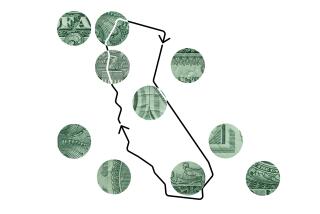Wilson, Cranston Total $51,000 in 1988 Speaking Fees
- Share via
WASHINGTON — Sen. Pete Wilson (R-Calif.) received $29,846 and Sen. Alan Cranston (D-Calif.) collected $21,300 in speaking fees from special-interest groups last year, according to their annual financial disclosure reports made public Monday.
Wilson’s honorariums more than compensated for the $10,100 government pay raise that he has refused to accept for the past two years. Cranston has announced that he will not accept honorariums in the future, but Wilson has indicated that he will continue to accept them.
Cranston, 74, a millionaire, received a California state pension payment of $62,902 and $18,426 from the Social Security Administration in addition to his $89,500 federal salary, his records showed. His blind trust yielded him an income of between $15,000 and $50,000, and various real estate investments provided additional income ranging between $1,000 and $50,000 each.
Wilson, also a millionaire, received income between $1,000 and $15,000 each from a variety of investments and also got more than $100,000 from his blind trust. He reported the purchase of a condominium in San Diego valued at between $50,000 and $100,000.
Members of Congress are not required to report their income exactly, but instead in specified ranges.
In addition to his honorariums, Wilson, who won reelection last November, took numerous trips by himself or with his wife last year at the expense of special interests. Most of these trips were between Washington and California.
Among the groups providing Wilson with free travel were the Agri-Business Council, Merchants and Manufacturers, California Winegrape Growers, Western States Meat Assn., General Electric Credit Corp., California Medical Assn., Asian Indian Assn., AT&T;, Securities Industry Assn., Independent Cities Assn., Fleishman Hilliard Inc., William Lyon University and Beech Aircraft.
Most of Cranston’s free trips were paid for by New Dimension Resources, a group founded by Cranston to promote voter registration. Others were financed by the Sierra Club, American Assn. of Trial Lawyers and United Food and Commercial Workers.
Cranston’s honorarium income for 1988 was less than the $34,900 he accepted the previous year, and the reduction appeared to reflect the growing controversy over these fees. In January, in the midst of the debate over a proposed 50% pay raise, the senator announced he would no longer accept honorariums.
The defeated pay raise had been coupled with a recommendation to abolish honorariums.
Under Senate rules, senators are prohibited from accepting honorariums in excess of an amount equal to 40% of their salaries, or $35,800.
Cranston received $2,000 each for speeches to groups listed as Atlantic Financial, International Electronic Manufacturers and Consumers of America, National Beer Wholesalers Assn., National Council of State Housing Agencies, Assn. of American Trial Lawyers, Gold and Liebengood, Great Western Financial Corp. and Building Owners and Managers Assn.; $1,000 each from SRI International, First Federal Savings Bank of California and American Land Title; and $500 from the National Assn. of Temporary Services.
Wilson received $2,000 each from the Capital Group; Orange County Life Underwriters Assn.; Littler, Mendelson, Fastiff and Tichy; Securities Industry Assn., National Assn. of Home Builders; the 20/20 Group; International Chiropractors Political Action Committee; National Medical Enterprises; Irella and Manella; Cedillos Testing Co.; and TCS Enterprises. He got $1,500 each from Williams and Jensen; Lillick McHose and Charles; and General Electric Credit Corp.; $1,000 from BHC Inc., First Federal Savings Bank of California and the Underground Contractors Assn. of Northern California; and $346 from the Merchants and Manufacturers Assn.
In 1987, Wilson received $31,700 in honorariums and gave $3,500 of it to charity.
More to Read
Get the L.A. Times Politics newsletter
Deeply reported insights into legislation, politics and policy from Sacramento, Washington and beyond. In your inbox twice per week.
You may occasionally receive promotional content from the Los Angeles Times.










